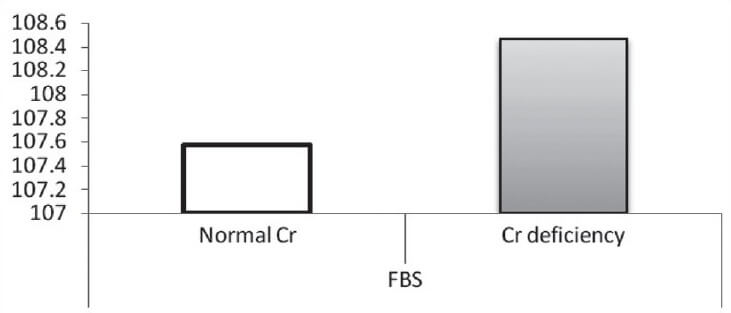Type 2 diabetes is a metabolic disorder where the body’s cells become less sensitive to insulin. This causes sustained high blood sugar levels and is associated with a host of serious health issues including cardiovascular disease and stroke. Individuals with type 2 diabetes are also more likely to be deficient in chromium – an essential mineral for the digestion of carbohydrates. What’s more, chromium supplementation has been shown to increase insulin sensitivity and improve blood sugar control. So is chromium an effective treatment for type 2 diabetes?
Article summary:
- Type 2 diabetes is a condition where the body’s cells fail to respond to insulin, leading to high blood sugar
- Studies have found that individuals with type 2 diabetes are more likely to be chromium deficient
- Chromium supplementation has been shown in multiple studies to improve insulin response in individuals with type 2 diabetes
- People with type 2 diabetes are also more likely to be deficient in other essential metals such as zinc and manganese
What is chromium?
 Chromium is a chemical element. It’s a metal with atomic number 24 and the symbol Cr.
Chromium is a chemical element. It’s a metal with atomic number 24 and the symbol Cr.
It’s also an essential nutrient in the human diet.
Chromium is primarily found in one of two forms: trivalent (chromium 3+) and hexavalent (chromium 6+). It’s the former version that is biologically active and found in food whereas the latter is considered toxic to humans.
The US National Institute of Health recommends adult males get at least 35mcg of chromium per day and 25mcg for females1. There is no upper intake level due to the fact that few if any serious side effects have been linked to excessive chromium consumption.
Many foods contain trivalent chromium – albeit in small amounts. Some of the best sources of this essential metal include:
- Broccoli
- Pears
- Shellfish
- Brazil nuts
- Grape juice
Chromium may also be found in certain meats and whole grains. Foods high in simple sugars tend to have low levels of chromium.
Chromium is involved in the digestion of fat, carbohydrates and protein. It’s also known to enhance the action of insulin, making it of particular interest for individuals with type 2 diabetes.
Type 2 diabetes
As you may already know, there are two main forms of diabetes mellitus: type 1 and 2.
Common to both disorders is a difficulty controlling blood sugar levels. With type 1 diabetes, this is caused by an inability of the pancreas to produce insulin – the hormone responsible for lowering blood sugar levels.
With type 2 diabetes, the pancreas often produces insulin normally. However, the body’s cells fail to respond to it in the correct way.
Usually, insulin causes sugar in the blood to be absorbed into the cells. But with type 2 diabetes, cells become less sensitive to this trigger, causing sugar to remain in the blood instead. If left to progress, the pancreas may eventually stop producing insulin.
Cases of type 2 diabetes have been steadily increasing since the 1960s. In 2015, it was estimated that 12.2% of US adults suffer from this metabolic disorder – with many unaware they have the condition1.
And type 2 diabetes has been shown to increase the risk of serious health issues including:
- Cardiovascular disease
- Diabetic retinopathy (reduced vision/blindness)
- Stroke
- Kidney failure
- Reduced blood flow (which can lead to limb amputation)
- Androgenetic alopecia (pattern hair loss)
Both forms of diabetes are caused by a combination of genetic and environmental factors – but to differing degrees. Type 1 diabetes is primarily caused by genes, whereas type 2 diabetes is mostly a result of environmental factors such as diet and exercise habits.
At present, there is no cure for type 1 diabetes. But with the right intervention it is possible for individuals with type 2 diabetes to come off medication.
The most effective way to reverse type 2 diabetes is aerobic exercise. It has been demonstrated many times that exercise can improve insulin sensitivity1,2. Diets aimed at controlling blood sugar levels – e.g. low sugar, low carbohydrate, low glycemic index (GI) – are also an effective intervention.
And certain dietary supplements have also been shown to improve insulin sensitivity – one of which is chromium.
Chromium deficiency and type 2 diabetes
Multiple studies have demonstrated a link between chromium levels and type 2 diabetes.
In this large study among the Chinese population, the chromium levels of 2153 people with newly diagnosed type 2 diabetes or pre-diabetes were compared with chromium levels of 2290 healthy controls. The researchers observed that:
“Our study demonstrated an inverse association between plasma chromium concentrations and T2DM and pre-diabetes in a Chinese population.”
– Inverse Association of Plasma Chromium Levels with Newly Diagnosed Type 2 Diabetes: A Case-Control Study. PMCID: PMC5372957
In other words, the lower an individual’s chromium levels, the more likely they were to be diabetic or pre-diabetic. These findings have been replicated in at least two other studies1,2.
In this study, researchers compared the fasting blood sugar levels of individuals with chromium deficiency against those with normal chromium levels. This is a useful test as it shows how efficient the body is at lowering blood sugar levels – something that becomes more difficult with type 2 diabetes.

As you can see from the graph above, fasting blood sugar levels were significantly higher in the group with chromium deficiency.
These results suggest that chromium deficiency reduces insulin sensitivity. When cells no longer respond to insulin, sugar is not absorbed by them and instead remains in the blood. This would explain why fasting blood sugar levels were higher in the chromium deficient group.
Effect of supplemental chromium on type 2 diabetes
Chromium supplements are an effective way to counteract deficiency.
What’s more, chromium supplementation has a demonstrable effect on insulin sensitivity and blood sugar control1,2,3.
Of the many studies supporting this claim, this one from 2015 is perhaps the most comprehensive. Researchers collated more than 62,000 responses from the National Health and Nutrition Examination Survey (NHANES) between the years 1999-2010.
Using this data, the researchers were able to identify any links between chromium supplementation and type 2 diabetes. They found that:
“Compared with nonusers, the odds of having T2D (HbA1c ≥6.5%) were lower in persons who consumed chromium-containing supplements within the previous 30 d than in those who did not […] The odds of having T2D were lower in those who, in the previous 30 d, had consumed supplements containing chromium.“
– Risk of Type 2 Diabetes Is Lower in US Adults Taking Chromium-Containing Supplements. PMCID: PMC4656904
Given the enormous sample size, it’s impossible to attribute these findings to coincidence.
Furthermore, this meta-analysis (study of studies) analyzed the results of 13 separate randomized, placebo controlled trials of chromium. The authors reach the same conclusion as the 2015 study:
“The analysis indicated that there was a significant effect of chromium supplementation in diabetics on fasting plasma glucose with a weighted average effect size of -29.26 mg/dL, p = 0.01, CI 95% = -52.4 to -6.09; and on total cholesterol with a weighted average effect size of -6.7 mg/dL, p = 0.01, CI 95% = -11.88 to -1.53 […] The available evidence suggests favourable effects of chromium supplementation on glycaemic control in patients with diabetes.”
– Chromium supplementation in patients with type 2 diabetes and high risk of type 2 diabetes: a meta-analysis of randomized controlled trials. PMID: 27019254
Together, these studies provide conclusive evidence that chromium supplementation can improve insulin sensitivity and reduce the risk of type 2 diabetes.
Related supplements
As well as chromium, it’s common for diabetic and pre-diabetic people to be deficient in other essential metals1.
One such mineral is zinc. Like chromium, zinc supplementation has been shown in multiple randomized controlled studies to improve blood sugar control and improve insulin sensitivity1,2,3,4.
Similarly, manganese is also strongly linked to type 2 diabetes. The story is again very familiar: individuals with type 2 diabetes are far more likely to be manganese deficient and supplementing this essential metal improves diabetic symptoms.
Chromium side effects
Although hexavalent chromium is considered toxic to humans, trivalent chromium (the kind found in food and in health supplements) is very safe.
As mentioned, there is no tolerable upper intake level for chromium in the USA. This is because no study has yet found serious adverse effects from chromium supplementation – even at extreme doses1.
But as is to be expected from a supplement used to control blood sugar, chromium may cause hypoglycemia (low blood sugar). Some people also report stomach upset as a result of chromium use.
Chromium may also interact with certain medications. As such, it is recommended you consult with your doctor before taking supplements containing chromium.
Chromium for type 2 diabetes: summary
“Chromium is an essential nutrient required for sugar and fat metabolism. Normal dietary intake of Cr for humans is suboptimal. The estimated safe and adequate daily dietary intake for Cr is 50 to 200 microg. However, most diets contain less than 60% of the minimum suggested intake of 50 microg. Insufficient dietary intake of Cr leads to signs and symptoms that are similar to those observed for diabetes and cardiovascular diseases. Supplemental Cr given to people with impaired glucose tolerance or diabetes leads to improved blood glucose, insulin, and lipid variables.”
– Chromium as an essential nutrient for humans. PMID: 9380836
Chromium is perhaps the most extensively studied dietary supplement for type 2 diabetes.
It may also be the most effective.
Though the exact mechanism of action is not fully understood1,2, there can be little doubt that chromium can improve insulin sensitivity and help control blood sugar levels.
We’ve seen plenty of studies demonstrate a link between chromium deficiency and type 2 diabetes. We’ve also seen comprehensive evidence – including meta-analyses and surveys of tens of thousands of people – that chromium supplementation can reduce the risk of developing type 2 diabetes.
This all suggests chromium may prevent pre-diabetic individuals from developing the disorder. And when combined with a low-sugar diet and appropriate exercise regime, chromium may even make it possible for those with type 2 diabetes to come off medication.
